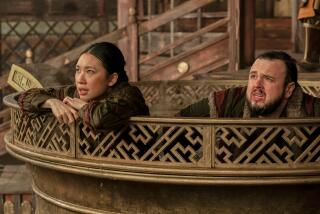A wrinkle in the timeline
- Share via
Once an odd leaf on the tree, something of a sport even in the world of science fiction -- one thinks immediately of “Bring the Jubilee” by Ward Moore and Philip K. Dick’s “The Man in the High Castle” -- alternate history in recent years has become more a branch all its own, a virtual subgenre, one that Harry Turtledove has made his own. In “The Guns of the South,” Turtledove had a group of white supremacists take AK-47s back to Gen. Robert E. Lee’s troops. In “Gunpowder Empire,” he posited a world in which the Roman Empire never fell.
Here, in “Curious Notions,” Germany wins the war -- the first world war. Actually, the book carries two passports, being also a member of another subgenre, the science-fiction juvenile, recalling for this reader such prime-time Robert A. Heinlein novels as “Tunnel in the Sky” and “Have Spacesuit -- Will Travel.”
Following “Gunpowder Empire” in the “Crosstime Traffic” series, “Curious Notions” tells the story of Lawrence and Paul Gomes, a father-and-son team who have come to this alternate reality to secure raw materials for their own denuded timeline and to maintain watch against the kaiser’s forces discovering the secret of travel between alternate worlds. Their front is a store, Curious Notions, selling such gadgets as record players and radios that are a notch or two ahead of indigenous technology.
The U.S., like much of the world, has been occupied by German forces for a century and a half. Only in China, due chiefly to its size, are the kaiser’s men unable to keep close watch and control. Meanwhile, outside, in the streets of this other San Francisco, Chinese tongs carry on their version of the Resistance.
Point of view shifts back and forth between Paul and fellow teen Lucy Woo. Paul and his father are often at odds, at least until the clinches.
Lucy’s family, like most others, barely gets by; Lucy returns home from her factory job to eat a simple meal and fall into bed. Both the young people, but especially Lucy, are well drawn, alternately rebellious and ingratiating in the manner of teenagers, motivations as much a mystery to themselves as to us.
The fulcrum point for the plot comes with the military police’s investigation of Curious Notions. Oblivious to the consequences of their acts, Paul and his father suggest that their products come from China and give, at random, the name of Lucy Woo’s father.
Therein lies a huge problem with the novel. It is far too much to ask readers to accept that the crosstimers, so set on secrecy, would sell goods so patently bound to draw attention.
For that matter, why the dance? Why would the Germans, who shoot people down in the streets for much less, not have closed the shop and beat the truth out of its proprietors? To his credit, Turtledove does attempt to anticipate these glitches and respond to them, even if unsatisfactorily.
It is difficult, in any novel invoking an alien place and culture, to avoid narrative lumps, those segments that give necessary information. But Paul and Lawrence Gomes spend entirely too much time telling one another things that would go unspoken between them, things the reader needs to know.
Characters also pass through unlikely thought processes that exist only to bolster the plot, as when Lucy imagines that Paul is from another place and time, then tells herself she is being silly, or is she?
Still, the pacing is excellent, the human relationships well represented if somewhat overdriven, and there are wonderful attempts (as in Heinlein’s juveniles) to break through ethnocentric barriers.
There is also rich detail: newsboys hawking a story that the wreckage of the Hindenburg has been found, descriptions of meals of rice flavored with scraps of meat, depictions of social and caste levels created by the occupation. Or this observation on colonized storekeepers and vendors: “If you stepped away from your shadow for a minute, they’d pry it off the sidewalk and try to sell it back to you.”
And while readers might cavil at the deus ex machina resolution, it is well set up. Harry Turtledove ties a good bow.
*
James Sallis is the author of numerous novels, including “Cypress Grove,” as well as the forthcoming “Drive” and “The James Sallis Reader.”
More to Read
Sign up for our Book Club newsletter
Get the latest news, events and more from the Los Angeles Times Book Club, and help us get L.A. reading and talking.
You may occasionally receive promotional content from the Los Angeles Times.









